I’m currently the CEO of Frame Contemporary Art Finland. Find me on Linkedin · Bluesky · Instagram · Facebook
This page is an archive of various projects, organisations and activities from the past decades. You can find my infrequently updated blog here.
~ ~ ~ ~
2020
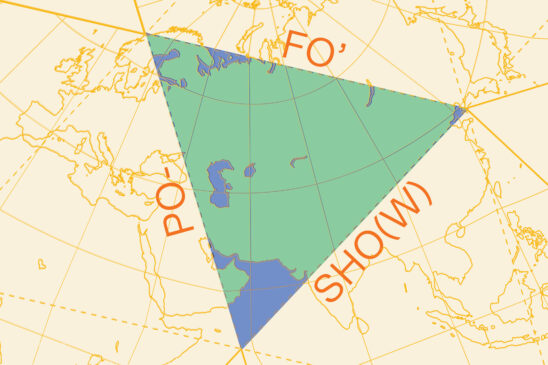
The Post-Fossil Show · HIAP Gallery Augusta, 1 Oct-1 Nov 2020
A rapid transition from the infrastructure and cultural practices reliant on fossil energy sources towards post-fossil solutions is essential in order to slow down climate change and reach the goals of The Paris Agreement. The post-fossil transition is a major cultural paradigm shift cutting through all spheres of life. The Post-Fossil Transition project as well as the exhibition strive to challenge the currently dominant paradigms and tropes related to ecological sustainability. As a historical reference point the exhibition includes a selection of material from the formative Suomenlinna 1968 seminar (featuring Buckminster Fuller, Victor Papanek and many others).
Artists & contributors: Saara Hannula & Antti Salminen, Laura Harrington, Saara-Maria Kariranta, Riikka Keränen & Hanna Kaisa Vainio, Bita Razavi, Elina Vainio, Kaisu Savola and Yrjö Sotamaa. Curator: Juha Huuskonen. Assistant curator & graphic designer: Dana Neilson. Exhibition designer: Paul Flanders.
info – photos
2019

Towards Smart Art Funding · Kone Foundation, 25 April 2019
How should art funding be developed to make it more resilient in the long run? How can we build more dialogue and trust between funders and art organisations? Could the goals of organisations be prioritized as a base for making funding decisions, rather than the agendas set by funders? What kind of models for sustainable funding have been developed elsewhere and how could they be adapted to the Finnish context?
Presenters: Dirk De Wit (Kunstenpunt/Flanders Arts Institute), Amrit Gill (Australia Council for Arts), Paula Tuovinen (Arts Promotion Centre Finland / Taike), Paul O’Neill (Publics), Erich Berger (Bioart Society), Satu Herrala & Hanna Nyman (Baltic Circle). Hosts & moderators: Anna Talasniemi & Juha Huuskonen. An event organised by Kone Foundation & HIAP.
info – video – report & materials: in Finnish – in English
2018
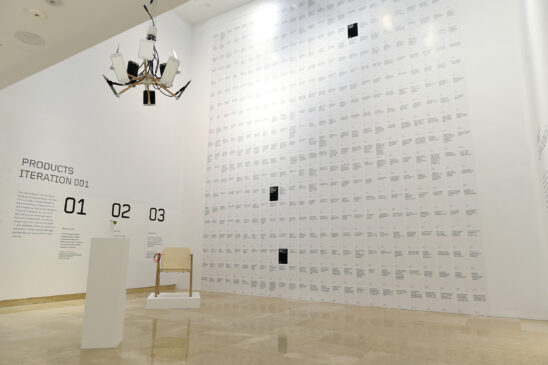
Contemporary Nordic Design Exhibition · He Xiangning Art Museum, Shenzhen, 1 December 2018–3 March 2018
HIAP is the Finnish partner in realising the Contemporary Nordic Design Exhibition at He Xiangning Art Museum in Shenzhen, China. The exhibition features designers from Finland, Sweden, Norway and Denmark and aims to challenge the stereotypes associated with Nordic design.
Chief Curator: FENG Boyi. Curators: Erlend Høyersten, Juha Huuskonen + Ian Yang, Bjørn Inge Follevaag, CHEN Shuyu, YU Xiangzhi. Participating artists/designers: Åsa Jungnelius, Anne Katrine Senstad, Ben Clement & Sebastian de la Cour, Jenny Nordberg, Katja Pettersson, Kivi Sotamaa & Tuuli Sotamaa, Lasse Andersen & Jens Lee Jørgensen, Laura Juslin & Lilli Maunula, Lise Bjerre Schmidt & Sofie Trier Mørk & Helle Vibeke Jensen, Michael T.Nartey, Petter Knudsen & Anders Berg & Steinar Hindenes, Philipp von Hase, Sami Niemelä & Simone Rebaudengo
info – photos: Juha Huuskonen – Huang Jing
2016
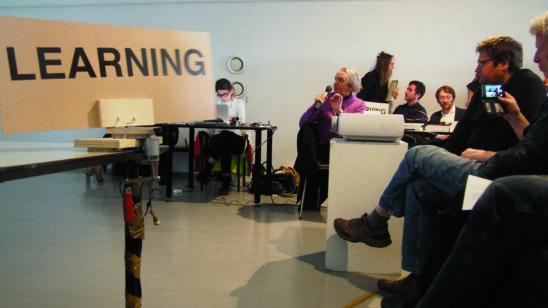
Polyphonic Discussion with Jacques Rancière · HIAP Gallery Augusta, 8 June 2016
The public presentation will consist of fragments, moments, and translation rehearsals of (im)possible concepts based on Rancière’s “poetics of knowledge” that have emerged in the “working cell” of the course as an open class: equality, emancipation, education, knowledge, art as knowledge, dislearning-learning, collective intelligence, the role of knowledge in a capitalist society.
info – photos
2015
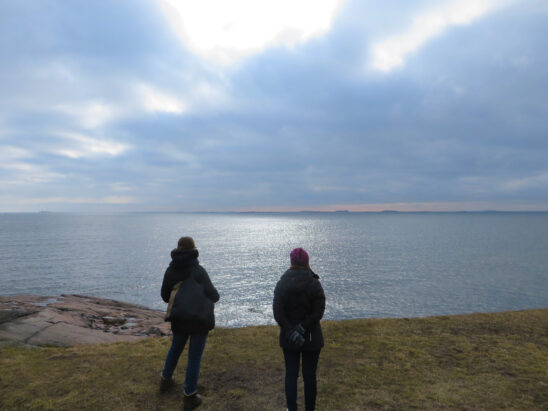
Learning Village Sveaborg · Suomenlinna, 27-30 March 2015
The Art of Hosting is a set of methods and approaches to group facilitation and systems change, developed by an international community of facilitation practitioners. The community shares methods, tools, and terminology to improve how people can understand and mobilize to respond to complex social, political, and economic change in a participatory manner. A Learning Village is a gathering for people who are already familiar with the Art of Hosting methods and principles. Learning Village Sveaborg in March 2015 was first such gathering in Finland. The theme of the gathering was ‘Living our Future – Exploring the ways in which we want to work and live together’.
Calling Team: Juha Huuskonen, Jan-Erik Tarpila, Vilma Mutka, Kirsi Joenpolvi, Stephanie Roiko. Co-hosts: Rainer von Leoprechting, Amanda Fenton, Lena Maria Jacobsson, Viola Tschendel, Nancy Bragard
info & photos + related material: What did I learn at Art of Hosting (2014) – Art of Hosting Workbook (pdf) – Learning Village Sveaborg 2016
2012
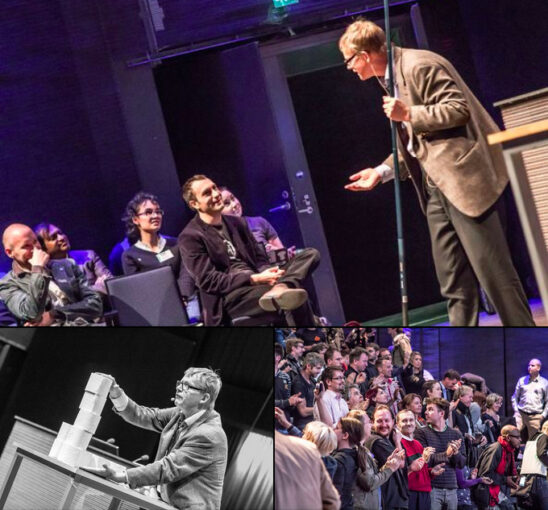
Open Knowledge Festival · Helsinki, 17-22 September 2012
The 2012 theme of OKFestival is Open Knowledge in Action, looking at the value that can be generated by opening up knowledge, the ecosystems of organisations that can benefit from such sharing, and the impacts that transparency can have in our societies. What kinds of new professions, ideas and community initiatives can emerge within our governments, markets, networks and neighbourhoods as a result of these engagements? The event featured 134 sessions including 306 individual presentations, 67 hours of hackathons and 61 hours of satellite events, altogether 484 hours of programme designed by 100 Guest Programme Planners.
OKFest 2012 Core Organising Team: Kat Braybrooke, Juha Huuskonen, Petri Kola, Massimo Menichinelli, Jussi Nissilä, Antti Poikola
website – summary of the event – programme leaflet (pdf) – photos – Hans Rosling’s lecture
Related:
The Open Book (2013)
2011
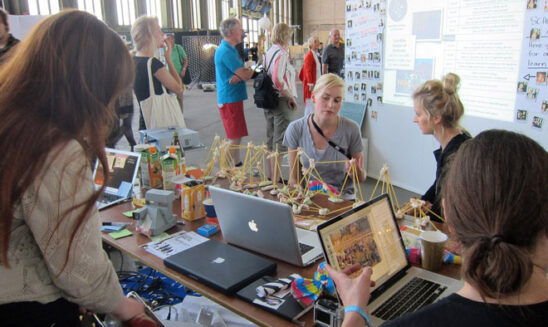
Open Helsinki @ DMY Berlin · Berlin Tempelhof Airport, 1-5 June 2011
I was invited to curate the Open Helsinki & Pixelache Helsinki programme for the year 2011 edition of DMY MakerLab in Berlin. This was the second edition of DMY MakerLab, dedicated to open design and maker culture. The DMY MakerLab serves as a public experimentation space for accessing new technologies, communicating and exchanging concepts.
Featured projects: YKON Game by YKON collective, Low2No School of Activism by Demos Helsinki, We *Love* Open Data project, OHANDA open hardware initiative, Temporary photoElectric Digestopians Worklab by Bartaku, Openp2pdesign.org (Massimo Menichinelli) and weather data visualizations by Miska Knapek
info – photos – video
2009

Climate Hack Workshop · Collegium Hungaricum / Transmediale, Berlin, February 2009
Climate Hack was a workshop for emerging researchers, designers and artists dedicated to reframing the international political climate using means well-outside the traditional political rhetoric. Using both old and new technologies, live internet data streams and a diverse collection of hacking skills, workshop participants produced a series of projects for public exhibition during the finals days of the Transmediale festival in Berlin, Germany. Driven by the often-absurd nature of politics and the collective creativity often generated from equally absurd artistic mediums, the workshop will rally around the task of hacking Cotton Candy machines. The workshop was a collaboration between Pixelache, Tinker.it and Kitchen Budapest.
Participants: Christopher Baker, Massimo Banzi, Eszter Bircsák, Juha Huuskonen, Miska Knapek, John Nussey, Aleksi Pihkanen, Melinda Sipos, Adam Somlai-Fischer, Tuomo Tammenpää.
workshop results – photos – video

PIXELACHE HELSINKI · 2-5 April 2009, Helsinki
With the 8th edition of Pixelache Helsinki, the festival is returning back to its roots. Instead of focusing on one main theme, we’ve allowed the programme to develop gradually around a selection of diverse topics. This reflects the nature of the festival: it’s built from bottom-up, with the voluntary efforts of the Pixelache community. We are expecting around 100 international guests to join this annual gathering of artists, designers, engineers, researchers, architects, hackers and activists.
In the programme: Alternative Economy Cultures, Artkillart, Art & Energy Consumption, ‘Art, Science & Ecology’, Audiovisual Hacking, Digital Craftsmanship, Live Video Lab, Signals from the South, Expedition to the Total Eclipse
website – photos: Antti Ahonen – Miska Knapek – Ville Hyvönen
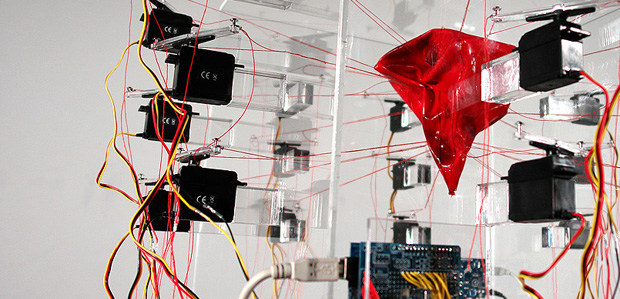
Digital Craftsmanship Seminar · 4 April 2009, Helsinki
According to the participants of the Digital Craftsmanship seminar, Digital Craftsmanship involves:
· Thinking with your hands
· Developing digital media cookbooks and recipes
· Getting different people to share same focus, taking steps in the areas where they are not comfortable
· Contributing back to the community of teachers
· Being cross-over artists and designers, enough skills to 99% of things needed
· Allowing non-specialists to enter, make technology itself culturally diverse
· Building spaces for learning that reflect the culture that we have online
Participants: Pixelache, UdK Berlin, Culture Lab Newcastle, Taik Media Lab, Konstfack Stockholm, Kitchen Budapest and other schools/labs. Initiator & moderator: Juha Huuskonen.
info
2008

NUAGE VERT / VIHREÄ PILVI · 22-29 February 2008, Helsinki
Every night from the 22 to the 29 of February 2008, the vapour emissions of the Salmisaari power plant in Helsinki will be illuminated to show the current levels of electricity consumption by local residents. A laser ray will trace the cloud during the night time and turn it into a city scale neon sign. Nuage Vert is a communal event for the area of Ruoholahti, which anticipates esoteric cults centred on energy and transforms an active power plant into a space for art, a living factory. In tandem, as a reversal of conventional roles whereby the post-industrial factory is turned into space for culture, Kaapeli (the cultural factory) becomes the site of operation and Salmisaari (the industrious factory) becomes the site of spectacle.
An artwork by HeHe (Helen Evans & Heiko Hansen) realised in Helsinki in collaboration with Pixelache (during the years 2005-2008).
website – photos – opening event photos – videos: Nuage Vert – First 30 seconds of Green Cloud goes online – Making of Nuage Vert – Presentation at Pixelache08
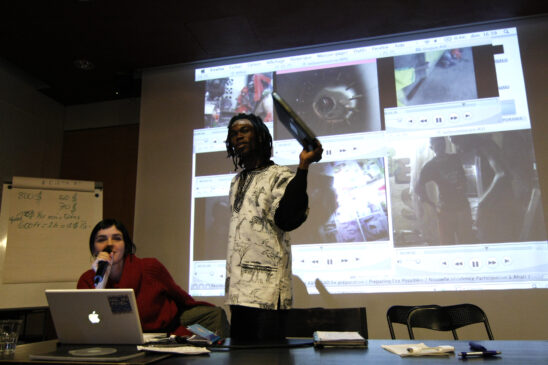
PIXELACHE UNIVERSITY · 12-16 March 2008, Helsinki
Can educational institutions learn something from grassroot communities on how to share knowledge and support innovation? We decided to use the word ‘University’ to make a reference to the Innovation University that is currently being set up in Finland. The Innovation University will start its activities in year 2009 and will then have three existing universities (University of Art and Design, University of Technology and Helsinki School of Economics) under its bureaucratic wings. Over the past two years there has been a heated public debate about whether combining these three schools together is a good idea or not. Pixelache Festival will contribute to this discussion by presenting concrete examples of non-conventional ways to educate and innovate. Our focus is in grassroot networks that can operate across institutional boundaries and do not have to serve immediate commercial interests or please mass audiences.
Also in the programme: N.I.P. – New Interfaces in Performance, Baltic Boxwars, Media literacy of young people, Traveling without moving, Re-mixed reality, Open hardware, Self-organising strategies, Signals from the South and Antidatamining.
Seminar participants: Kitchen Budapest (HU), Eléonore Hellio (FR), Alejandro Tamayo (CO), Juha Huuskonen (FI), Petri Kola (FI), Juhana Kokkonen (FI), Helen Evans (FR), Evelina Domnitch (RU/NL) and Tapio Mäkelä (FI).
website – photos – videos & more photos – self-organising survey
2007

Mediawala Festival · 1-2 March, New Delhi, India
I was a ‘Co-cartographer’ of the first Mediawala Festival, planning the structure and the programme of the event with Zeenath Hasan & Aditya Dev Sood. The first evening of Mediawala resembled an Indian wedding procession: the artworks were placed on top of hand-pushed carts and moved around as a night time parade around the Global Arts Village, with audience following and participating the show. The second day was a seminar held at the British Council auditorium in New Delhi. Mediawala was a part of Doors of Perception 9 event (theme ‘Juice: Food, Fuel, Meaning’).
Featured works/artists: Streetfood Radiothela by foodradio_network (India), Quicksand presents in technicolor… by Quicksand (India), Apsara VJ Thela by Mo Ling Chui (Canada/ China), Ride-on-Dinner by Mick Douglas and team (Australia/ India), Dancing Around Trees by Keity Anjoure (France) and Ville Hyvönen (Finland), Zara Zor Lagake, Haiya! by Karthikeya Acharya and Vinay Silva (India), Toploaded Whirlpool of Lassi by Hari Nair and Team (India), Chandni Bar by Seagrams (India), McVideogame by La Molleindustria (Italy), Emotions in Man by Kati Aberg (Finland), Algorithmic Poetry by Le Ciel Est Bleu (France), Squishing it into the Slimy Depths of the Tethys Sea by Abhishek Hazra (India), Hawker Caterers Inc by Ghitorni street food hawkers (India)
info & photos
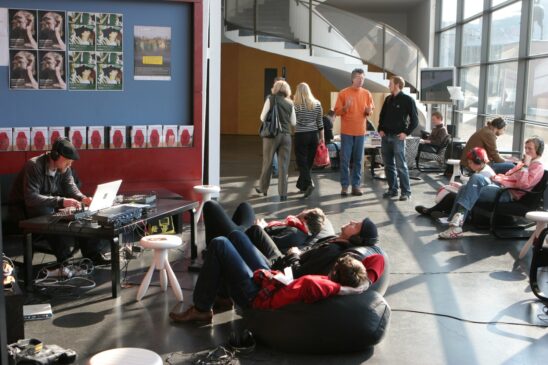
PIXELACHE HELSINKI: Architectures for Participation · Helsinki, 29 March-1 April 2007
‘Architectures for Participation’ is a term that has been used to refer to Flickr and other similar ‘Web 2.0’ environments which enable the creativity of the Masses to reach the Masses. YouTube, MySpace and other similar environments have rapidly emerged as powerful tools for building communities and creating entirely new contexts for creativity.
Long before the ‘Web 2.0’ days, various non-profit grassroot networks and media art protagonists were setting up communities providing similar services. The Indymedia network was a precursor to the Blogosphere, internet radio was an early free voice in many countries, mailinglists and wikis have been helping various grassroot initiatives to get themselves organised. What is the role of these tools and communities in the future? Should we all start uploading our files to YouTube and MySpace? Or can there be a happy co-existence where non-profit, custom crafted community platforms still have an important role?
Also in the programme: Nordic VJ Meeting, Pixelache Lounge exhibition, Remote Presence: Streaming Life workshop, Prix Möbius Nordica competition, audiovisual performances by Hexstatic and Lia + @c.
Seminar participants: Alexander Ljung & Eric Wahlforss / trustmojo.com, Sampo Karjalainen / Sulake, Aleksi Neuvonen + Roope Mokka / Sitra Society 2.0 report, Terike Haapoja / Oranssi ry, Armin Medosch / The Next Layer or: The Emergence of Open Source Culture, Lisa Haskel / Ravensbourne College, Cristina Ricupero / Self-organisation: Counter-economic Strategies, Timo Jones / NODE.London, Andrew Paterson / Tähtikuvitelma, Marko Ahtisaari / BLYK, Jyri Engeström / Jaiku, Elukka Eskelinen / Forum Virium, Teppo Turkki / IADE, Ilkka Tuomi, Gunnar Green, Jean-Baptiste Bayle / myownspace.fr, Niko Nyman
website – photos
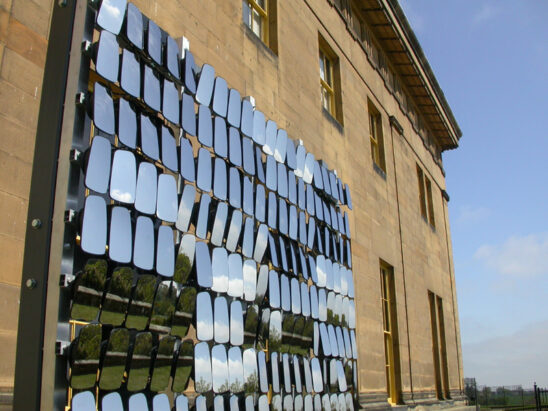
Picture House: Film, Art and Design at Belsay Hall · Belsay Hall, UK, 5 May – 20 Sept 2007
I was invited by Dott07 programme director John Thackara to curate three commissions for the Picture House exhibition at Belsay Hall Castle and Gardens during the summer 2007. The three commissioned works were Aleph by Adam Somlai-Fischer & Bengt Sjölén, Ghost Pole Propagator by Golan Levin and Hereafter by UVA.
info & photos – the making of Aleph – the making of Ghost Pole propagator
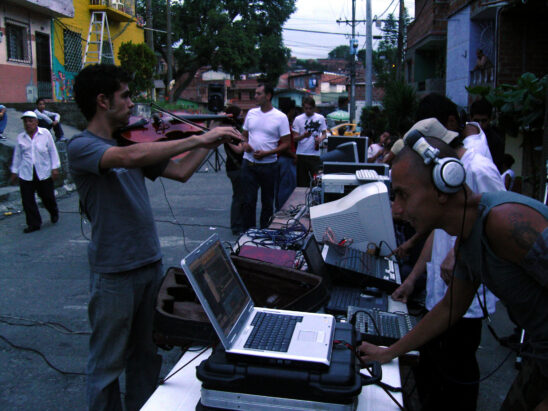
Pixelazo & Selvatorium · Medellin, Antioquia, Colombia, 13-20 June 2007 & Leticia, Amazonas, Colombia, 21-30 June 2007
CULTURAL EXCHANGE>>>SOUTH / NORTH
COLOMBIA / FINLAND / EUROPE / THE WORLD
Creating encounters to share ideas and knowledge between…
South * North
‘Developing countries’ * ‘Developed countries’
Traditional culture * Western culture
Marginalized communities * International creative networks
Natural/Organic * Digital/Synthetic
Lo-tech * High-tech
Slow * Quick
Presentations/workshops: Régine Debatty / WMMNA, Juha Huuskonen, Petri Ruikka & Henrik Axlund, Alejandro Tamayo, Constanza Cuetia & Gustavo Adolfo Ulcué Campo / El Tejido de Comunicación de la ACIN, Felipe Guerra / eRECICLAJE, Series Media / Medellin, Medellin Wireless, Tatiana Avendaño & Ricardo Cubides / Microchipcha, Alfredo Vargas Arana, Walter Hernández Romero
website – photos/Pixelazo – photos/Selvatorium
2006
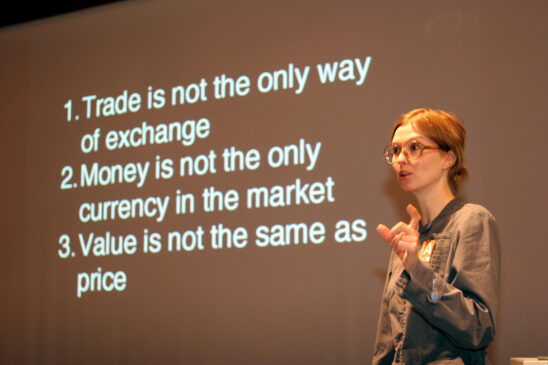
PIXELACHE HELSINKI · Helsinki, 14-17 April 2006
* Mobile arts and experiments & Locative media workshop
* Three new audiovisual performances: Orbital Glider/Raumgleiter by Scanner (UK), a Finnish version of Grenze (FR) and an environmental project Peurakaira vs Päätehakkuu (FI). Pixelache Club and Pixelache VJ Battle + Video in Theatre seminar.
website – call for proposals – photos – publication (pdf) – video (helsinki)
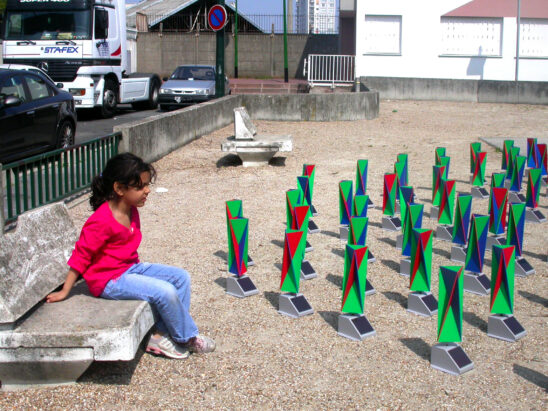
MAL AU PIXEL 2006 · Paris, 19-29 April 2006
This spring the Pixelache festival is organised for the first time in Paris, under the name Mal au Pixel. The festival presents a diverse program of exhibitions, performances, club events, workshops and seminars, spreading over a duration of 10 days. Mal au Pixel is organised by three Parisian organisations – Ars Longa, Confluences and Mains d’Oeuvres with additional events by Institut Finlandais, Project 101 and Galerie Vanessa Quang.
Festival theme: Dot Org Boom ( le « boom dot org » ).
website – photos – article in Libération
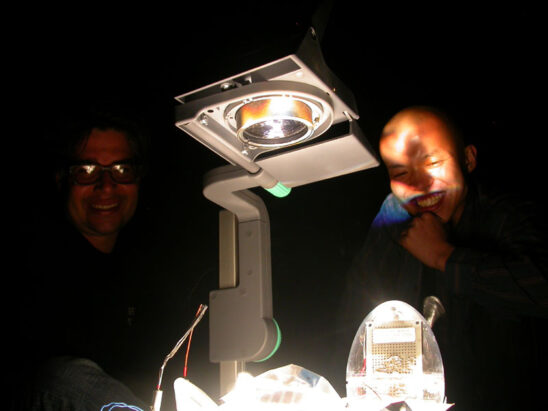
INTERFERENCE 2006 · San Martino Valle Caudina, Italy, 3-5 August 2006
The theme of Interferenze 2006 was ‘Naturalis Electronica’, the encounter of nature and electronic art. I was invited to curate the interactive/software art section which eventually featured following artists/projects: Casey Reas (Process 6, 7, 8), LeCielEstBleu, Ralf Schreiber, Marianne Decoster-Taivalkoski (Aquatic), An Earful of Italy (Dinah Bird & Jean-Philippe Renoult with Kate Sieper) and IMPROVe (Zeenath Hasan & Richard Widerberg). The music programme featured many Pixelache alumni artists and other familiar faces: Keiko Uenishi, Emi Maeda, LIA, Sine Wave Orchestra, Sasu Ripatti, AGF, etc.
info – photos – neural.it review
2005
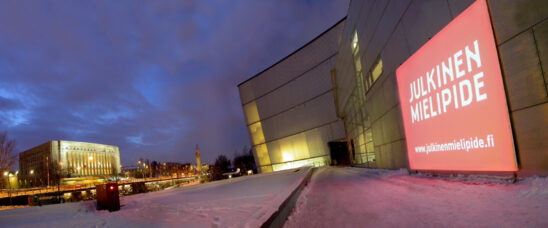
PLAN*B FOR ARKADIANMÄKI · Helsinki, 24 Jan-6 Feb 2005
Kiasma Museum of Contemporary Art
PLAN*B FOR ARKADIANMÄKI was an alternative Parliament house which offered opportunities for the citizens to voice their opinion and govern. The project organised a series of seven online referendums. The local audience in Helsinki was able to follow the progress of the referendums in real-time from a large-scale outdoor video screen located opposite to the Parliament House. The referendum topics were chosen by grassroot initiatives which challenge the conventional patterns of representative democracy. During the voting period, several discussions and other public events took place at Kiasma Museum of Contemporary Art. The final results of the PLAN*B referendums were submitted to the Finnish Parliament.
Featured projects: 2000.katastro.fi, Amorph!03 festival – Micronations, Homokaasu.org, The Yes Men, The Long Now Foundation, Utopian World Championship, Kaulbach Society
Participants of the discussion events: Alexander Rose (Long Now Foundation), Per Norbäck (Demoex), Paavo Arhinmäki (Vasemmistonuoret), Jiri Räsänen (Leader of The Free World project), Jon Brunberg (Utopian World Championship), Oliver Kochta & Tellervo Kalleinen (Amorph!03 / Micronations), Irina Krohn (member of the Finnish Parliament) and Kaisa Eskola (Attac).
Website: www.julkinenmielipide.fi (in Finnish) – www.publicopinion.fi (in English)
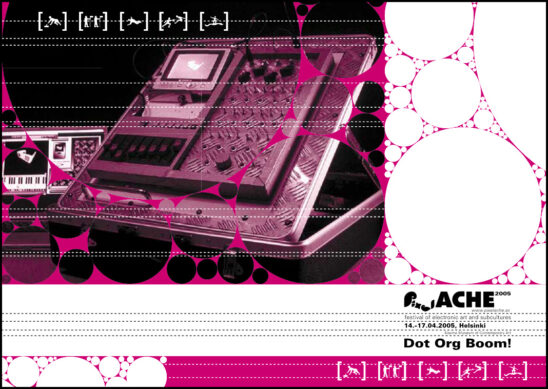
PIXELACHE 2005: Dot Org Boom · Helsinki, 14-17 April 2005
The main theme for PixelACHE 2005 is The Dot Org Boom. Dot Org Boom is the non-profit version of the Dot Com Boom (RIP). The essential ingredients of this rapidly growing phenomenon are open source community, open content initiatives, media activist networks and myriads of NGOs around the world. PixelACHE Festival brings together a diverse group of artists, engineers, activists, architects and designers to discuss and develop the future of Dot Org Boom. PixelACHE 2005 also features the following program sections: VJ Culture and Audiovisual Performances, Experimental Interaction and Electronics, Interactive & Participatory Cinema, particle/wave hybrid radio workshop.
website – call for proposals – photos – publication (pdf)
video (clips from 2003 & 2005 & 2006) – video (glimpses of 2005)
Related events:
Pixelache warm-up event at Nifca, Suomenlinna – Dot Org Boom seminar at the Embassy of Finland, Stockholm – PixelVÄRK audiovisual club at Fylkingen, Stockholm – MiniPixel at Mains d’Œuvres, Saint-Ouen
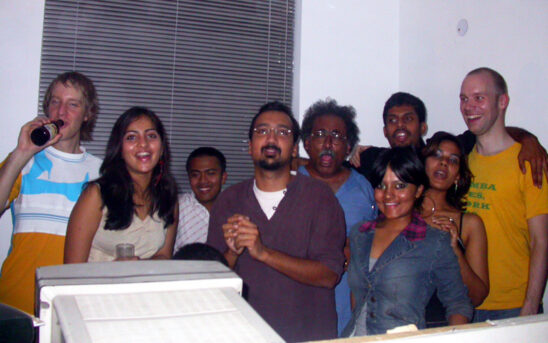
VJing in Delhi workshop / Doors of Perception 8 · New Delhi, 18-20 March 2005
VJing in Delhi workshop is an introduction to live video performance aka VJing. The VJ scene has developed rapidly during the past few years – there are currently thousands of active VJs around the world and for some it has even become a serious profession. One reason for this development is that the necessary equipment for VJing has become more accessible – video projectors are getting cheaper and computer has replaced the video mixer as the main tool of a VJ. The VJ scene brings together a very diverse crowd of creative people – visual artists, film-makers, media activists and people involved in the club/music scene. The workshop was organised in connection with Doors of Perception 8.
info
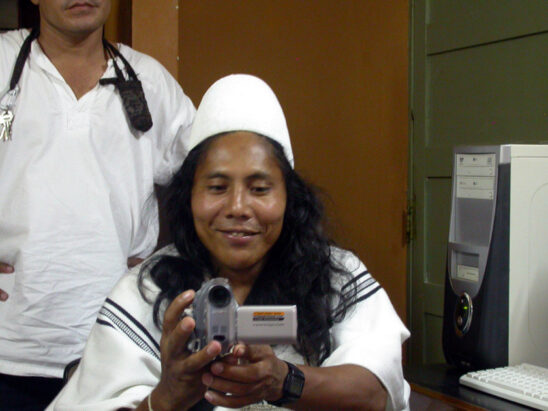
VJ workshop for the Kogi tribe · Santa Marta / Colombia, August 2005
I hosted a VJ workshop with Vanessa Gocksch / Intermundos in connection with the Salón Internacional del Autor Audiovisual film festival in Barranquilla and for a group of Kogi tribe members in Santa Marta, Colombia.
info & photos
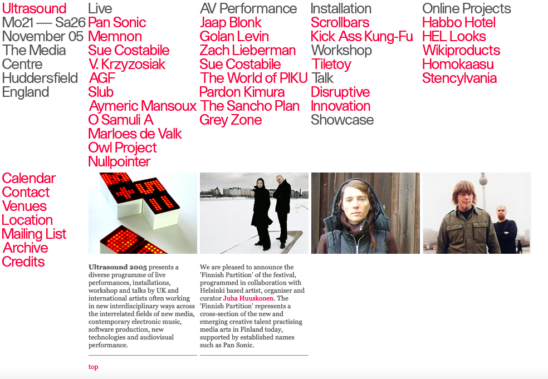
ULTRASOUND · Huddersfield, 21-26 November 2005
Ultrasound 2005 presents a diverse programme of live performances, installations, workshop and talks by UK and international artists often working in new interdisciplinary ways across the interrelated fields of new media, contemporary electronic music, software production, new technologies and audiovisual performance. The ‘Finnish Partition’ represents a cross-section of the new and emerging creative talent practising media arts in Finland today.
website
Related event:
FINN~ISH at Ambientv.net, London, 21 November 2005
2004
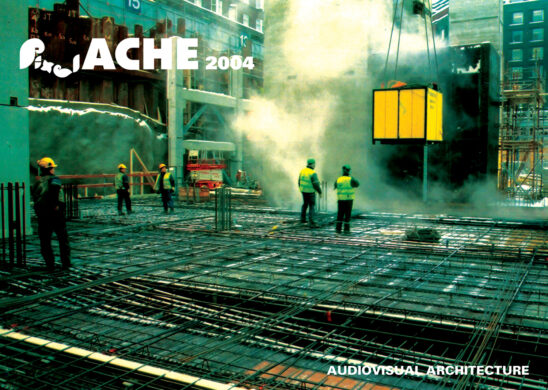
PIXELACHE HELSINKI + STOCKHOLM 2004: Audiovisual Architecture
Stockholm, 26-28 March 2004
Fylkingen, CRAC, Sauna office for contemporary art, Metro Club
Helsinki, 1-4 April 2004
Kiasma Theatre, MUU Gallery, Restaurant VIA, Gloria, Club Bundolo, Lasipalatsi
PixelACHE is an annual festival of electronic art, design and technology. The theme for this year is Audiovisual Architecture, experimenting with the border between the digital domain and the physical world. Interactive furniture, installations in public spaces, sculptures and graffiti, ambient sound projects, audiovisual experiments and creative misuse of technology.
website (helsinki+stockholm) – call for proposals (helsinki) – photos (helsinki) – photos (stockholm)
Article: The Art of Defining Software Culture: the Benevolent Dictators of the Read_me Festival (for Framework magazine)
2003
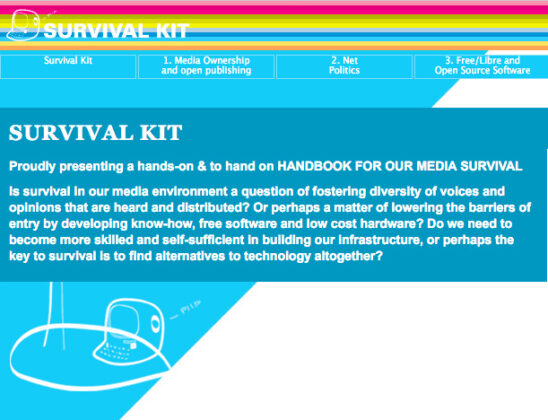
RAM – Re-Approaching New Media 4 workshop: SURVIVAL KIT
Suomenlinna, 3-9 November 2003
Is survival in our media environment a question of fostering diversity of voices and opinions that are heard and distributed? Or perhaps a matter of lowering the barriers of entry by developing know-how, free software and low cost hardware? Do we need to become more skilled and self-sufficient in building our infrastructure, or perhaps the key to survival is to find alternatives to technology altogether?
website – photos – video
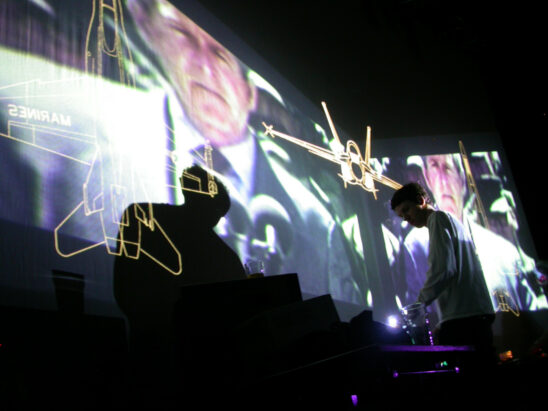
PIXELACHE HELSINKI: The Art of VJing · 10-13 April 2003
Kiasma Museum of Contemporary Art, Mother, Jumo Jazz Club
The second pikseliÄHKY temporary audiovisual lab will be set up in Kiasma, Museum of Contemporary Art in Helsinki. The event will feature 4 days of shows, screenings, workshops and panel discussions. The theme for this edition is ‘VIDEOJUKKA’ – we explore the art of VJ’ing, the act of mixing and creating video material in a live situation in connection with the music. International and local VJ stars will perform and give workshops on VJ tools and technologies. Panel discussions and talks will analyse the background and future of VJ’ing, as seen from the perspective of visual arts, film making and other relevant contexts.
website – call for proposals – photos – poster & leaflet – video (hki 2003+2005+2006)
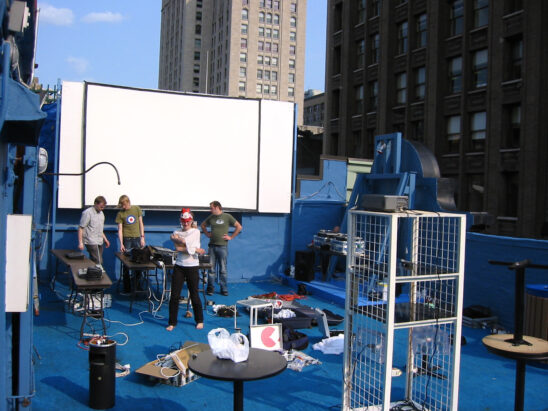
PIXELACHE NYC & MONTREAL · 31 May-7 June 2003
NYC: Gershwin Hotel, SHARE @ Openair, New Music on North Sixth @ Galapagos
Montreal: SAT, Society for Arts and Technology
PikseliÄHKY // pixelACHE is an international laboratory for creative experimenting with audiovisual technologies. After our successful event in Helsinki, the festival is arriving to New York and Montreal. The events consist of audiovisual performances, interactive cinema screenings and an exhibition of media art projects. Most of the featured artists are coming from Helsinki, the hometown of pixelACHE. They are emerging artists representing yet-to-be-discovered art forms from the fringe of the Finnish media art scene. The theme for this year’s edition is the art of VJ’ing, mixing and manipulating video material in a live performance situation.
website (nyc) – website (mtl) – photos (nyc) – photos (mtl) – poster & leaflet (nyc) – poster & leaflet (mtl) – NYTimes article
2002

THE MOMENT OF LONG NOW · a very slow news tv station
The Moment of Long Now is an alternative news tv channel. The channel shows short snippets of news footage with a pace that is a hundred times slower than what we are used to. A piece of custom made software magnifies and manipulates the images in real-time, creating an illusion of a virtual camera which is able function and move around within a still moment.The name of the project was inspired by the Long Now Foundation, an organisation with a goal “to promote ‘slower/better’ thinking and to foster creativity in the framework of the next 10,000 years.”
info – video
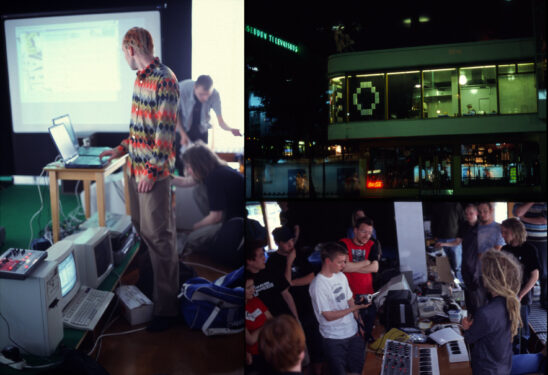
PIKSELIÄHKY / PIXELACHE (first edition) · 23 – 25 May 2002, Helsinki
* audiovisual experiments and creative misuse of technology
* DIY lo-fi/hi-fi performances and installations
* the art of programming
Participants: Jarryd Lowder, Pink Twins, O Samuli A,Tuomas Toivonen, Tomi Knuutila, Markus Renvall, Toiminto,Tommi Keränen, Perttu Hämäläinen, Korento, Folio, Antti Ahonen & Panu Johansson, Juha Huuskonen, Halcyon, Marko Myöhänen & Timo Kurkikangas
website – photos – planning meeting notes (in Finnish)
2001
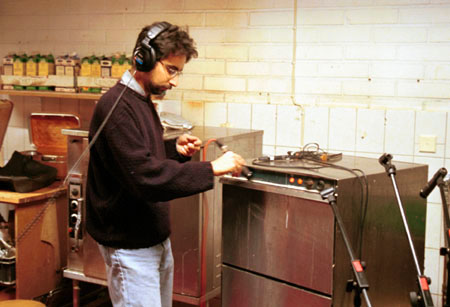
AvantoAkatemia 01 · Kipsari & LUME & Aula, Helsinki, 7-1 November 2011
farmersmanual will strengthen network forms of organization, while simultaneously making your life difficult in old hierarchical forms. Examples in PD and MAX/MSP/nato within a networked environment will be part of the presentation. [The User] will demonstrate how to apply a similar approach as they used in their Symphony for Dot Matrix Printers to any conventional household equipment – in this case a dish washing machine.
info & photos
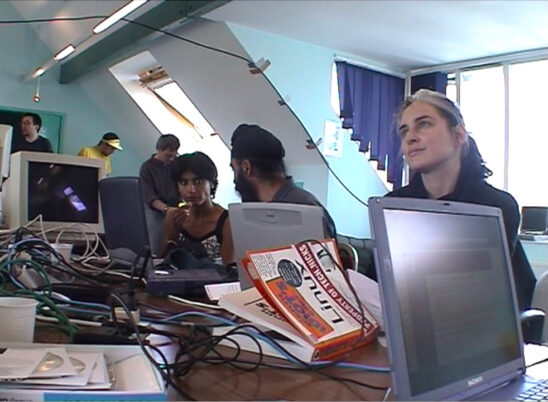
Tech_2 · Windmill City Farm & The Cube, Bristol, UK, 7-1 November 2011
Tech_2 is a series of events, workshops, seminars and discussions, involving people who are using digital technologies for building independent media structures, developing and exposing their own forms of expression, and supporting interventions into social and cultural spaces.
Participants: Manu Luksch / Ambient TV, Micah Anderson (riseup.net, indymedia.org), Rachel Baker, Luther Blissett, Heath Bunting, Monica Narula & Supreet Sethi (Sarai), Kate Rich, James Wallbank (Redundant Technology Initiative), Patrice Riemens + many others.
info & photos – poster
2000

AVANTO FESTIVAL (first edition) · Helsinki, 8-12 November 2000
Avanto is a festival of experimental music and moving image. Avanto highlights the continuities between several generations of experimental art; many of the artists share a common critical attitude towards the prescribed uses of technology. From the minimal sounds of the onkyo school to the recontextualization of mainstream visual culture, Avanto offers hardcore avant-garde art combined with liberating laughter and sub-arctic madness.
Featured artists: Merzbow, Pita + Hecker + Skot + Fennesz (MEGO), Scanner, Pan Sonic, Kaffe Mathews, Op:l Bastards, Ovuca, Pink Twins, Ilppo Pohjola, Ian Helliwell, Seppo Renvall, Myriam Bessette, Hanna Haaslahti + many others.
website – photos
1999
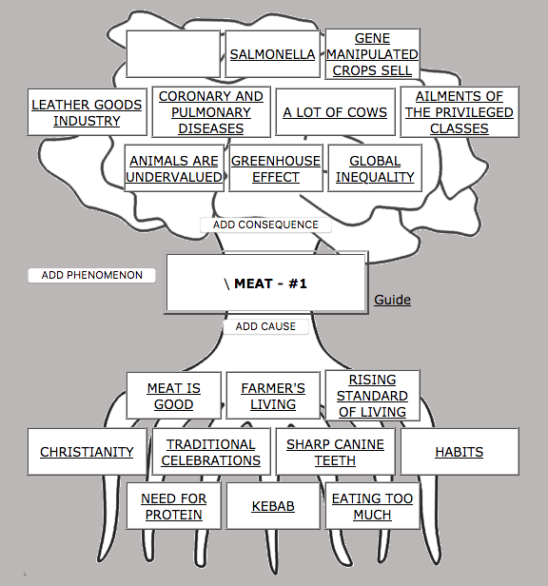
eko.katastro.fi
Ideologies of various greenish tints are washing through our collective consciousness and our experiences of the phenomena affecting our environment can not be measured. They can, however, be collected and shared. katastro.fi and Dodo association built and collected the basis for a web, which they hope the visitors will augment with their own experiences and observations. eko.katastro.fi is an ecologically biased work, which documents reality and its alternatives as they are perceived. It consists of the Tangle of causes and effects, open to the public and accessible through your own eco-profile.
eko.katastro.fi programme also featured “Earth Force/Maan Voimaa” documentary film by Marko Yliniemi, video installation ‘Walker’ by Anu Pennanen and a series of screenings and discussions. eko.katastro.fi was a part of TEMP – Temporary Media Lab at Kiasma Museum of Contemporary Art.
website – photos

Timetable · Tokyo, 15 October-28 November 1999
Sitting in one of several chairs at a large, round table, a visitor will discover dials that control time. Through the operation of these dials, images projected onto the table pass freely through the past, the present and the future, mutating as they go; the microcosm of time lies in the hands of the visitor. The twentieth century has transformed our concept of time, and Timetable attempts to reproduce the manipulation of time – its shrinking, its recording and even its elimination – that technology has made possible.
An artwork by Perry Hoberman, commissioned for the ICC Biennale ’99. Winner of the Grand Prix, ICC Biennale ’99. Software Design & Interface Design Assistance: Juha Huuskonen. Sound: Elliott Sharp. Production Assistance: Scott Konzelman.
info – video 1 – video 2 – NYTimes review
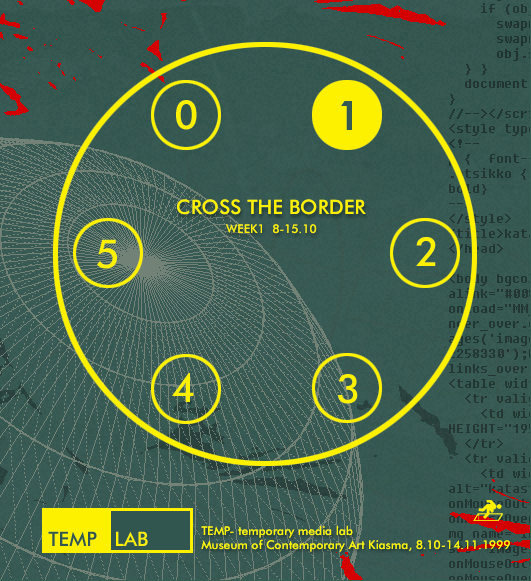
TEMP – TEMPORARY MEDIA LAB · Helsinki, 8 October-14 November 1999
TEMP stands for temporary media lab, a production facility that enables groups, networks and, individuals working on the crossover between new media arts and social, political and economic topics to discuss, develop, and realize their projects.
The idea of a tmp\ media lab, situated within an existing event, museum, or similar institution originates from dissatisfaction with the current forms that presentations of media projects typically take during conferences and other public events. Exhibiting webpages still does not make much sense: their lively, layered complexity gets lost. Even the interactive installation is not the proper medium to express net.works. In previous years much has been done to introduce new media to an ever-growing audience. But the networks themselves, their mysterious and seductive aspects, remained invisible. It is hard to represent or even visualize what is actually happening on a mailinglist, a newsgroup, a chatroom. Demo-design can give us a clue, but it remains soulless, empty and too easily turns flows and exchanges into dead information. Now that the varieties of virtual communities are growing, it is no longer enough to merely announce their existence. People demand substance–not only outsiders but, most of all, the members of the groups themselves.
TEMP lab team: Concept & Coordination by Geert Lovink, Production by Seppo Koskela, Web design by katastro.fi (Juha Huuskonen, Mikko Karvonen, Simo Rouhiainen). Commissioned by Perttu Rastas / Kiasma.
website
1998
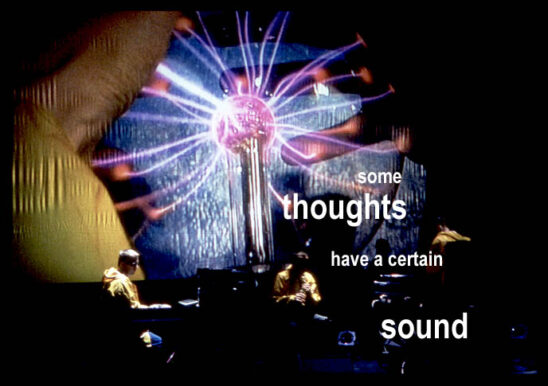
IMAchannel · 18 November 1998
RinneRadio with katastro.fi. An experimental performance in which live music was combined with interactive visuals. The IMAchannel transmission was the opening event for the rotation98 music video festival at Kiasma.
photos & info